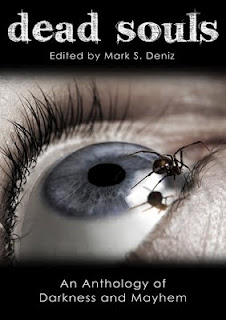Our book review thread is back! P.G. Bell dives into Dead Souls, a collection of short tales that charts the murky depths of mankind.
Reviewing short story anthologies can be a tricky business. Each tale has to be judged on its own merits while the anthology as a whole – with its various authors, tones and voices – has to be considered as a cohesive unit. Many anthologies make life easier by opting for a particular theme, motif or character around which to group their stories but Dead Souls is a little more abstract.
As editor Mark S. Deniz makes clear in his foreword, the anthology uses its title (taken from a song by Joy Division) as its starting point, launching an examination of “human nature through short stories about people, people who do terrible things.”
That sounds clear enough, and you could be forgiven for assuming the book sits firmly in the horror genre, especially given Reece Notley’s gorgeous, if disturbing cover. But it soon proves to be a rather more nebulous beast.
Perhaps this (and the fact that I’m not familiar with Joy Division) is why I struggled with Dead Souls. It’s not that I didn’t like the stories – there is a lot to recommend on that front – but they interpret the book’s mission statement so broadly at times, that I found myself grasping for the thread that bound them all together.
The book feels almost like a collection of dark folktales at first, as the opening stories draw heavily on pagan mythology, using the old beliefs as a sinister counterpoint to the “civilised” morals of their protagonists. Of these, there are a few stand-out examples. T.A. Moore mines the rich seam of Norse mythology in ‘Licwiglunga’, as an ageing nun renounces her faith to mount a rescue mission into the afterlife. The brooding atmosphere and bitter final twist are worth savouring. ‘The Unbedreamed’ by Christopher Johnstone tells the story of a man who sets out to recapture his missing ambitions. Capturing the spirit of a lively, fireside Celtic folk tale, it is one of the few stories whose protagonist seems willing to transcend the spiritual void in which he finds himself.
Other writers aim further afield. Gary McMahon (who appears to be succeeding in his one-man takeover of the horror genre) weaves a neat, successfully ambiguous tale about a shell-shocked British soldier haunted by his own cowardice and the threat of an intangible, supernatural pursuer in ‘A Shade of Yellow’. Elizabeth Barette, meanwhile, takes us the Asian subcontinent in ‘Golden Thread’, a bittersweet tragedy of love, loss and betrayal.
As with any anthology, there are misses as well as hits. For all its atmosphere and intriguing set-up, ‘Dry Places’ by Tom English quickly devolves into a standard monster-in-the-dark affair, while ‘The Price of Peace’ by Anna M. Lowther tells a story within a story, neither of which quite deliver in the final payoff. And Ken Goldman’s ‘Mercy Hathaway Is A Witch’ spends too much time building to an obvious twist whilst trying to shock us with the corruption of its central character, who never seemed to cling too tightly to his morals in the first place.
As it progresses, Dead Souls shies away from mythology in favour of more contemporary thrillers and, whether coincidentally or not, feels more confident in the process. Rebecca Lloyd’s ‘Contaminator’, which recounts a chance encounter on the London Underground, is brilliant – short, sharp and truly shocking. Equally good is ‘The Ringing Sound of Death On The Water Tank’ by Stephanie Campisi. A deceptively simple tale of a child’s visit to family friends, it is redolent with a sense of isolation and impending doom, finally boiling over into a tense and well judged climax. ‘Sandcrawlers’ by Robert Hood treads similar territory to great effect, as a private detective revisits the event that has haunted him since adolescence – witnessing the murder of two girls on a beach. Particularly shocking is the fact that the murders in question are not fictional and remain unsolved.
Finally, Kaaren Warren’s ‘The Blue Stream’, the only science fiction story in the anthology, wraps things up with a story that can stand proudly alongside any in the genre.
So, did I “get” Dead Souls in the end? Yes, I think I did. It’s built on a mindset, rather than a theme – a philosophy that chaos, evil and death are the only real truths underlying existence and the anything more – light, hope, love, even God Himself – is futile and illusory. Inevitably, such a book was never intended to be a laugh riot but, even so, I found the barrage of doom and despair a bit of a slog in places. There are moments of defiance – including a brilliant one from Adolf Hitler, of all people – but they are few and far between. Perhaps I’m getting soft in my old age, but I would have liked just a few more moments of redemption to punctuate the mood.
So, as I said, a tricky business these anthologies. And while Dead Souls may not quite transcend the sum of its parts, the parts themselves are well worth a read.
‘Dead Souls’ edited by Mark S. Deniz. Published by Morrigan Books. ISBN-13: 9789197760584. Paperback: £10.06. Kindle edition: £4.27.


Regarding the title: see also http://en.wikipedia.org/wiki/Dead_Souls_%28disambiguation%29
Thanks for taking the time to comment, Campion. I did have a brief look at the wikipedia pages when reading the book but decided to take it at face value, and use the statement in the foreword when defining the book's "mission statement". A wider reading probably wouldn't have hurt though!
Hope you're enjoying the blog – we've got some more book reviews on the way soon.